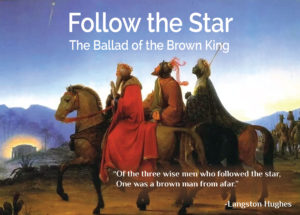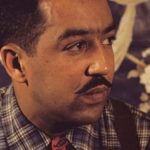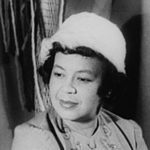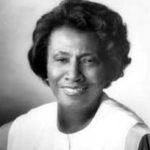
Thirteenth Cathedral Christmas
Saturday, December 10, 2022 at 8:00 pm
Pre-concert talk with director Freddie Coleman at 7:00 p.m.
“Of the three wise men
Who followed the star,
One was a brown king
From afar.”
– Langston Hughes
This special annual holiday event will amplify messages of diversity and hope for this festive season. The Ballad of the Brown King, a Christmas cantata composed by Margaret Bonds, in collaboration with poet Langston Hughes, will be performed in Seattle for the first time. Written in honor of Martin Luther King, Jr, Bonds’ nine-movement choral work focuses on Balthazar, the “Brown King” of the Three Kings, who traveled to Bethlehem to witness the nativity scene.
Seasonal works composed and arranged by Black American musicians round out this family holiday tradition. As always, a candlelit rendition of Silent Night concludes the concert.
– Margaret Bonds in a letter to poet Langston Hughes

Margaret Bonds

Langston Hughes
A fair amount of attention has been paid recently to the African-American composer Florence Price, but Price also taught composition to other women. One of her students was Chicago native Margaret Bonds (1913-1972). While growing up in Chicago, Bonds took piano lessons from her mother and eventually composition with Price and William Dawson, who was also black. After earning two music degrees from Northwestern University, Bonds won fame as a pianist. She was the first black soloist to play with the Chicago Symphony. But her major achievements were as a composer and arranger, starting at age 5.
Bonds made her way east to New York, where she became a close friend of the renowned poet Langston Hughes. The 24-minute Christmas cantata, The Ballad of the Brown King, written in 1954, was their collaborative masterpiece. The title of The Ballad of the Brown King derives from the eleventh-century description of one of the magi, Balthazar, as being “a dark, fully bearded king.” That description refutes portrayals of the magi as white and reinstates black people into the central narrative of Christianity, recognizing a black magus and portraying the wise Balthazar as an equal of the other wise men who celebrated the arrival of the newborn Christ the King.

Jasmine Johnson, mezzo-soprano
The original, seven-movement version of The Ballad of the Brown King for voice and piano was premiered at the East Side House Settlement (New York) on Sunday, 12 December 1954, with Margaret Bonds herself at the piano. Later, inspired by the Civil Rights Movement, Bonds quickly set about revising the work and asked Langston Hughes to provide text for two additional movements. She eventually orchestrated it. This expanded orchestral version (now comprising nine movements) was completed in August 1960 and premiered on network television on Sunday, 11 December 1960 in a CBS television special titled Christmas U.S.A. This performance was dedicated to Dr. Martin Luther King, Jr.

Namarea Randolph-Yosea, tenor
Yet Bonds’ orchestration was never published. As for Hughes’ text, it was just as significant then as it is now for its African-American perspective on the Nativity story. As Bonds scholar Ashley Jackson puts it, “it allows black listeners to feel part of a story that in so many depictions leaves them out.”
Note the dates: December 11 and 12 (1960 and 1954, respectively). The Seattle Choral Company’s December 10 performance is one day from the sixty-second and sixty-eighth anniversaries of The Ballad of the Brown King’s entries into American public life. Conductor and musical scholar Malcolm J. Merriweather created a new orchestration of this work in 2018, calling for a small group of strings plus harp and organ. This is the version the Seattle Choral Company will perform on December 10.

Malcolm J. Merriweather, Arranger
The perspective of The Ballad of the Brown King is introduced succinctly in the libretto’s opening line: “Of the three wise men who came to the king, one was a brown man, so they sing.” In the work’s nine movements, totaling about 24 minutes, Bonds intertwines stylistic elements of European Romantic orchestral writing, jazz harmonies, the energy and phrasing of American spirituals, Calypso syncopation, Christian hymn-singing, and even Arabian-inspired ornamentation. All of these musical facets might be seen to represent the cumulative experience of black people through history.
Bonds is just one example of the rich culture of African-American classical music in Chicago in the late 19th and early 20th centuries, where women in particular seem to have felt empowered to create to a degree not typical of the rest of America at that time. Whatever the reason for that particular blossoming of black women’s talent, one can only hope that performances of their works will inspire further listening and appreciation.

R. Nathaniel Dett
He grew up in Niagara Falls, Ontario and later moved to the U.S. with his family. He was exposed to the piano at a very young age. His early musical experiences were mostly with the light salon music of the day, now mostly forgotten, mixed with a scattering of classics. His early compositions are in that style, reflecting the ragtime and dance music popular at the time. After hearing a string quartet perform a slow movement by Antonín Dvořák at Oberlin, Dett found his true calling, writing that “Suddenly it seemed I heard again the frail voice of my long-departed grandmother calling across the years; and in a rush of emotion which stirred my spirit to its very center, the meaning of the songs which had given her soul such peace was revealed to me.”
From then on, Dett composed music that used Negro folk idioms in a new way, striving for the highest goals of musical art. He railed against ragtime influenced minstrel shows, viewing them as a corruption of Negro folk music and a reinforcing of racial stereotypes. Dvořák’s challenge to American composers to use their own folk materials for the basis of musical creation found a wonderful answer in Nathaniel Dett’s music.
Besides his solo piano music, Dett’s works include many choral pieces in motet form such as Listen to the Lambs, Holy Lord, Chariot Jubilee, a magnificent Ave Maria (included in our program), and an extended oratorio, The Ordering of Moses.
The trailblazing composer and teacher Florence Price (1887 – 1953) was the first African-American woman to be recognized as a symphonic composer, and the first to have a composition played by a major orchestra. Price was born in Little Rock, Arkansas, and began taking music lessons from her mother at a young age. She then studied composition at the New England Conservatory in Boston under Wallace Goodrich and Frederick Converse and privately with George Whitefield Chadwick. Upon graduating in 1906, Price moved to the South to teach music at the college level. In 1927, Price and her family relocated to Chicago to escape the violent racism in Little Rock. Price began a period of great productivity as a composer during this period as she wrote her acclaimed Symphony No. 1 in E Minor and the beloved art song Songs of the Dark Virgin. Today, she is best known for her art songs and arrangements of spirituals for solo voice, but her catalogue of over 300 works also includes many pieces for choir. In her work, Price combines traditional classical forms and a more conservative musical style with traditional African-American musical characteristics, offering skillfully crafted pieces with rich and interesting harmonies.

Florence Price
Choral works held a special place in Margaret Bonds’ output. She wrote smaller pieces and choral arrangements of many of her solo works, but she also wrote at least three large-scale choral works. Her first is her most frequently performed choral work — The Ballad of the Brown King, which was written to honor one of the Magi, King Balthazar. (See notes above on The Ballad of the Brown King on this page.)
On 17 January 1968 in Van Nuys, California, Bonds completed St. Francis’ Prayer. That was a turbulent time in America, and Bonds was determined that her legacy include serving the Black community and the education of the next generation of African American youth. This SATB piece, which was published as recently as 2020, is set to an anonymous prayer for peace known as “The Prayer of St. Francis of Assisi.” The premiere performance was sung by the renowned Albert McNeil Jubilee Singers in Los Angeles. More and more, the incredible compositional brilliance of Margaret Bonds is becoming available for others to perform.

Margaret Bonds
Adolphus Hailstork (b. 1941) received his doctorate in composition from Michigan State University. He had previously studied at the Manhattan School of Music, under Vittorio Giannini and David Diamond, at the American Institute at Fontainebleau with Nadia Boulanger, and at Howard University with Mark Fax. Among his early compositions are Celebration, Out of the Depths (1977) and American Guernica (1983). New commissions include Earthrise, a large-scale choral work for James Conlon and the 2006 Cincinnati May Festival and We Rise for Freedom: The John P. Parker Story for the Cincinnati Opera. Hailstork is currently working on a requiem for chorus and orchestra, A Knee on The Neck, in response to the murder of George Floyd.

Adolphus Hailstork
Dr. Hailstork has written numerous works for chorus, solo voice, piano, organ, various chamber ensembles, band, and orchestra.
A Carol for All Children, composed in 1995, celebrates the simple idea that all children have value and are brought into the world with hopes that their future and their world will be bright and full of possibilities. Choreographed through the lens of a Queer artist of Kenyan and Indian descent, the work further highlights the need for agency and solidarity, giving all children the right to be valued, loved and nurtured regardless of race, creed or means in an equitable and loving world.
Rosephanye Powell, pronounced ro-SEH-fuh-nee, (b. 1962) is an American choral composer, singer, professor, and researcher. She has been hailed as one of America’s premier composers of choral music. She has a diverse and impressive catalogue of works published by some of the nation’s leading publishers. Her compositions include sacred and secular works for mixed chorus, women’s chorus, men’s chorus, and children’s voices. Her style of composition has been characterized by beautiful melodies, strong rhythmic emphasis, rich harmonies often derived from African-American popular styles, and varied vocal textures including counterpoint.

Rosephanye Powell
Her influences include African-American musical styles; the choral works of J.S. Bach, G.F. Handel, Mozart and Verdi; the art songs of William Grant Still, Undine Smith Moore, Fernando Obradors, Samuel Barber, Emmanuel Chabrier; and the spiritual arrangements of H.T. Burleigh, J. Rosamond Johnson, William Dawson, Hall Johnson, Lena McLin, and Roland Carter. Powell’s works are popular throughout the world, especially in Europe and Asia. She is in constant demand as a composer-in-residence, clinician, adjudicator, conductor, and performer.
Powell’s Christus Natus Est (Christ is born) is a setting of a poem by Harlem Renaissance poet Countee Cullen. This intriguing work is a powerful statement that respects the difficulties of the African American heritage. The title is used as a litany response to other words that lift up the downtrodden in stark words without apology.
Undine Smith Moore (1904-1989), the granddaughter of enslaved people, began studying piano at the age of seven. She attended Fisk University, where she studied piano and first began to compose. In 1924, at the age of 20, she became the first graduate of Fisk to receive a scholarship to Juilliard. She graduated cum laude in 1926, and soon after became the supervisor of music for the Goldsboro, NC public school system. She began teaching piano, organ, and music theory at Virginia State College (now Virginia State University) in 1927, where she remained on faculty until her retirement in 1972. She commuted to Columbia University in New York City between 1929 and 1931 and received her Master of Arts in Teaching.

Undine Smith Moore
Moore traveled extensively as a professor, conducting workshops and lecturing on Black composers. Among her many awards were the National Association of Negro Musicians Distinguished Achievement Award in 1975, the Virginia Governor’s Award in the Arts in 1985, and a Candace Award from the National Coalition of 100 Black Women in 1984. She was also awarded honorary Doctor of Music degrees by Virginia State University in 1972 and Indiana University in 1976, and in 1977 was named music laureate of Virginia.
Known to some as the “Dean of Black Women Composers,” Moore is most widely known for her choral works, though she also wrote for piano and various instrumental ensembles. Her Scenes from the Life of a Martyr is a 16-part oratorio on the life of Dr. Martin Luther King, Jr., which was nominated for a Pulitzer Prize in 1981.
I Believe This Is Jesus is a spirited arrangement of a traditional spiritual with infectious vocal lines. The text is both a proclamation of faith and an invitation for all to “come and see” Jesus.
Moses Hogan was born in New Orleans on March 13, 1957. Until his untimely death in 2003, he was one of the most celebrated contemporary directors and arrangers of spirituals. In his short life, he created dozens of new original arrangements of classic spirituals, and formed several choirs that performed them with new vitality.
Moses manifested his musical talent at a young age. He anticipated the sound of church bells and guided his uncle Edwin Hogan’s choir by waving his hands as they sang. He was a graduate of the New Orleans Center for Creative Arts (NOCCA), Oberlin Conservatory of Music in Ohio and he also studied at New York’s Juilliard School of Music and Louisiana State University in Baton Rouge. Throughout his life, he created a number of new original arrangements of classic spirituals and formed several choirs such as the Moses Hogan Singers and the Moses Hogan Chorale. He also served as editor of the Oxford Book of Spirituals.

Moses Hogan
Hogan is considered the world’s greatest arranger of spiritual music. His contemporary settings of spirituals, original compositions and other works have been admired by audiences and commended by critics worldwide. His arrangements are still being used as the foundation for high school, college and community choirs today.
